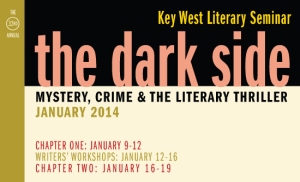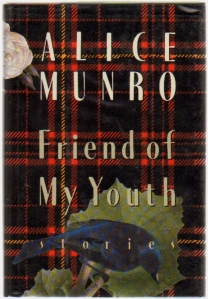Into the dark ...
 The 2014 Key West Literary Seminar is sold out, both sessions -- no surprise, given the star power of many of the writers who will be appearing, many of them for the first time in Key West. There are, however, two free sessions that are open to the public on Sunday afternoons -- Jan. 12 and 19 -- so if you don't have a ticket you're not completely out of luck.
If you're one of those people who just likes to read a few books by Seminar authors or is overwhelmed by the sheer number of writers on the roster here, here is my recommendation: Forget all those rock star guys and look to the women. Especially the younger women. For me, the Seminar's chief appeal -- beyond getting to hear from really smart and often hilarious writers -- is the discovery of emerging writers, the non-rock stars. Who, more than likely, will be the rock stars of tomorrow. This year, for whatever reason, most of those newer voices seem to be women.
The 2014 Key West Literary Seminar is sold out, both sessions -- no surprise, given the star power of many of the writers who will be appearing, many of them for the first time in Key West. There are, however, two free sessions that are open to the public on Sunday afternoons -- Jan. 12 and 19 -- so if you don't have a ticket you're not completely out of luck.
If you're one of those people who just likes to read a few books by Seminar authors or is overwhelmed by the sheer number of writers on the roster here, here is my recommendation: Forget all those rock star guys and look to the women. Especially the younger women. For me, the Seminar's chief appeal -- beyond getting to hear from really smart and often hilarious writers -- is the discovery of emerging writers, the non-rock stars. Who, more than likely, will be the rock stars of tomorrow. This year, for whatever reason, most of those newer voices seem to be women.
While the hard-core thriller world is male-dominated, it's not like women writing crime is a new thing. The Golden Age's primary stars were women: Agatha Christie, Dorothy L. Sayers, Margery Allingham. Since then, P.D. James and Ruth Rendell have been writing great books. More recent and successful female crime writers include Sara Paretsky (who will deliver the keynote at the Seminar's first session, Chapter One), Elizabeth George (Final Chapter keynote), Laura Lippman (Chapter One panelist), Lisa Unger (Chapter One), Tess Gerritson (Final Chapter) and Kate Atkinson, who will not be at the Seminar, but whose Jackson Brodie books are among my all-time favorites. The hottest rock star at this Seminar, despite the presence of such crime writing celebrities as Carl Hiaasen, Lee Child and Michael Connelly, might just be Gillian Flynn, of Gone Girl fame. She'll be at Chapter One, including a talk at the free Sunday afternoon session.
The writers I'm most looking forward to hearing from, though, are the women you may not have heard of ... yet. I'm guessing they're the rock stars of the future: Megan Abbott, Sara Gran, Attica Locke, Malla Nunn ... and my personal favorite, because I'm especially fond of historical crime, Lyndsay Faye. I already loved her books set in 1840s New York and her Sherlock Holmes solves Jack the Ripper book, Dust & Shadow. And she couldn't have been smarter or more generous when I interviewed her via email for Littoral, the Seminar's online journal. The books by these younger women are on the radar screens of librarians and smart readers of non-formulaic crime fiction. I hope the Seminar introduces them to many more.
If you are interested in following the Seminar in close to real time, the best way to do that is via Twitter. I'll be posting @keywestnan, the Seminar itself is @keywestliterary and many folks will probably use the hashtag #kwls. If you're enough of a Twitter person to subscribe to lists, both the Seminar and I have lists called the Dark Side, of the writers attending this year's Seminar so you can follow them even if they don't use the hashtag.

